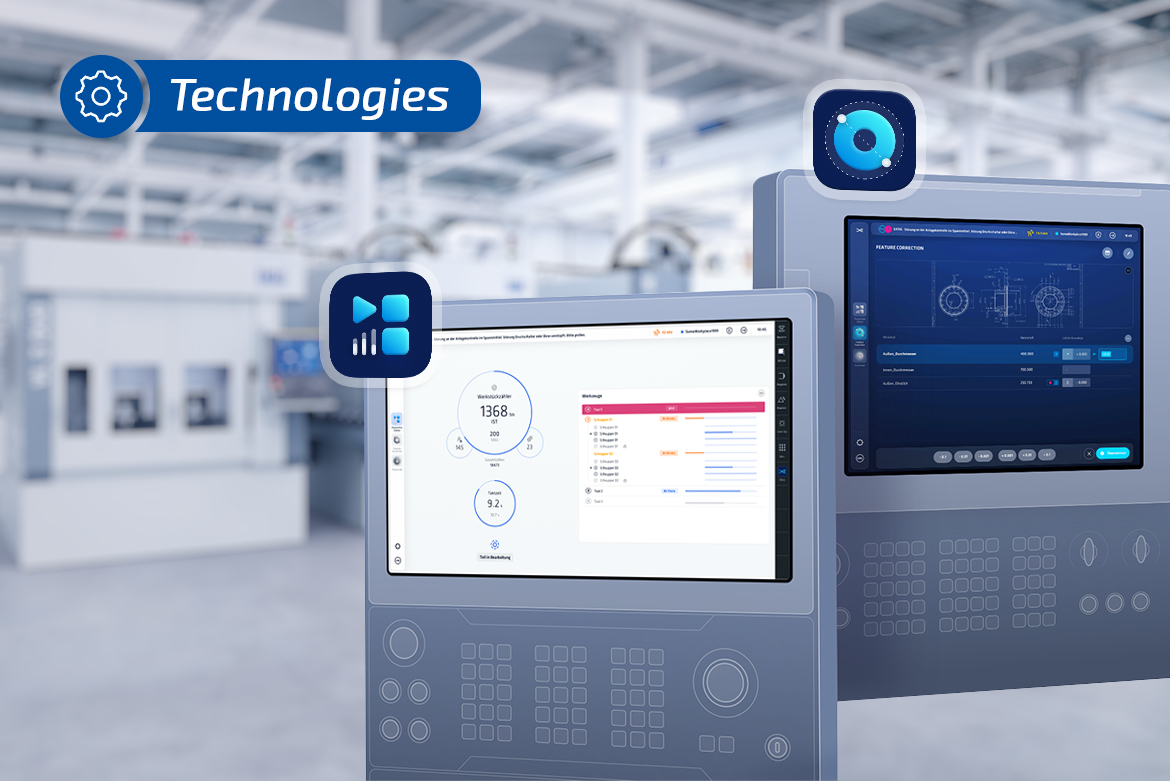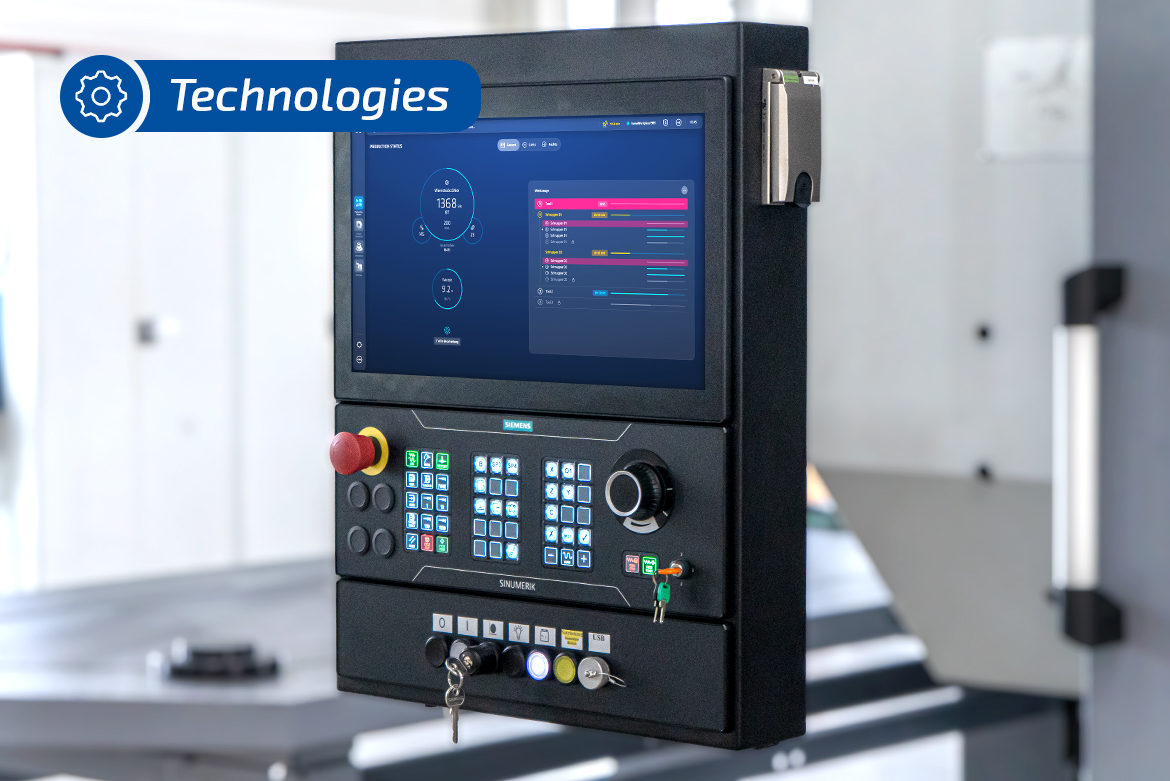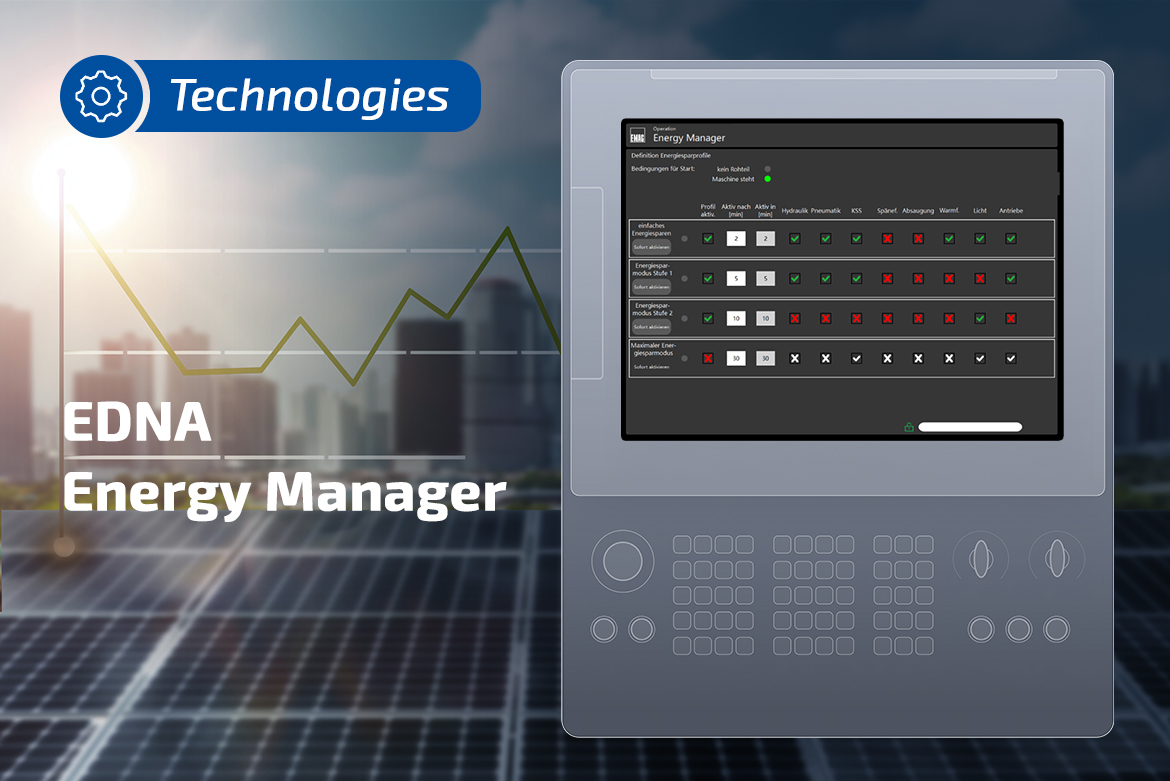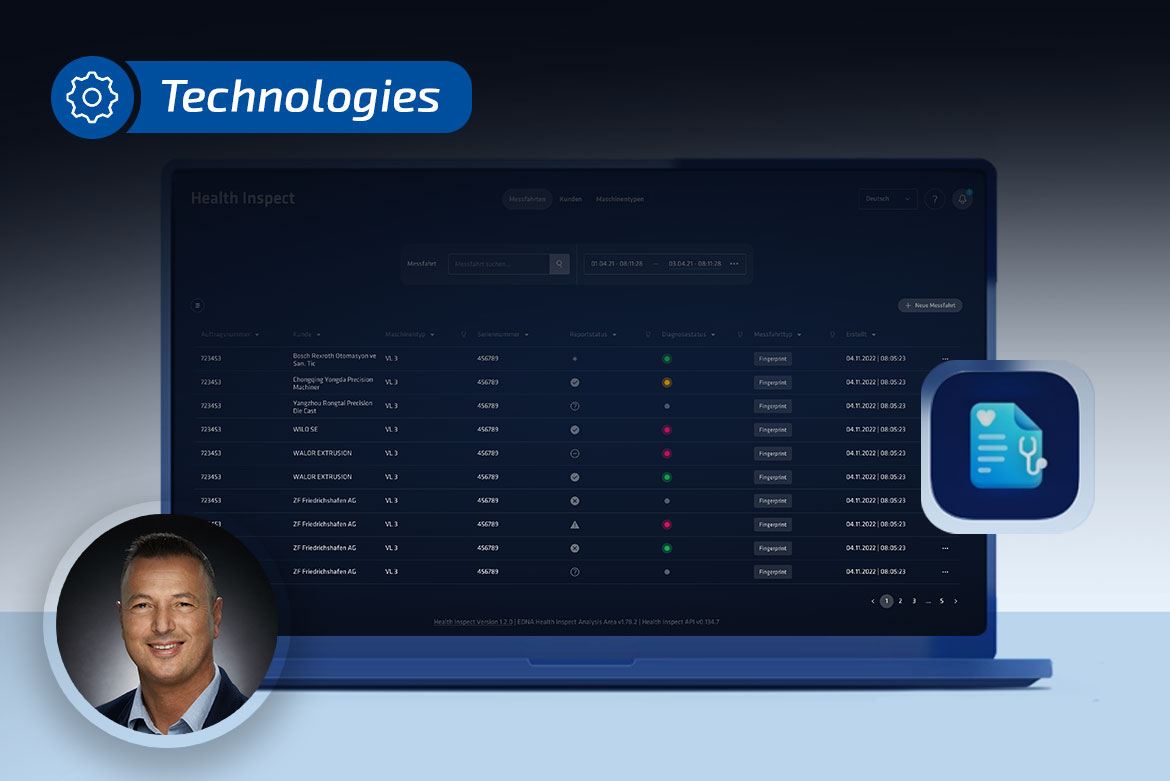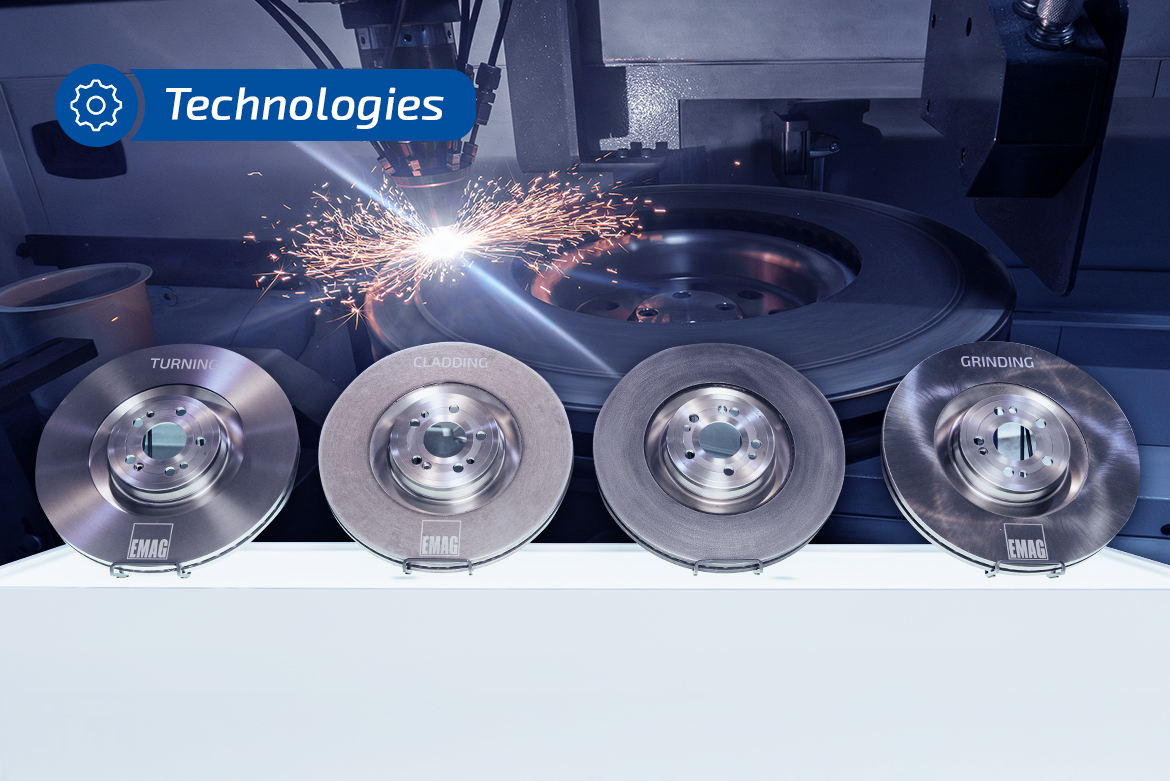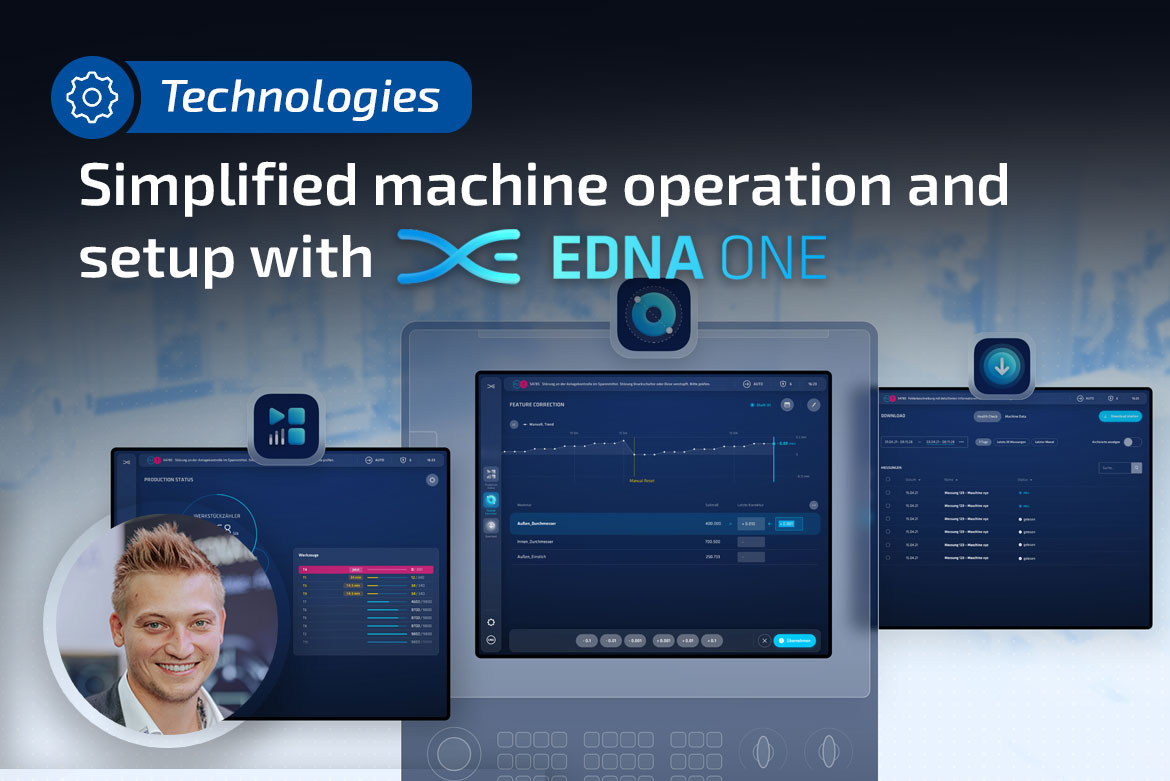Experience the new generation of EDNA Feature Correction and EDNA Production Status.
EDNA Feature Correction is a core component of EDNA ONE and enables the manual or automatic adjustment of production features in real time. This ensures that product quality remains stable over the long term and process deviations can be corrected immediately.
EDNA Production Status is a central module of EDNA ONE and displays the current status of a machine as well as the overall production progress in real time. Operators receive a clear overview of active programs, upcoming work steps and possible downtimes. This makes machine operation more transparent, reaction times are reduced and production can be controlled much more efficiently.
Technologies
With the introduction of Sinumerik One, EMAG continues its commitment to the latest CNC control technology from Siemens. Replacing the proven 840D sl platform, SINUMERIK One serves as the foundation for the next generation of digitally connected manufacturing systems. Combined with EMAG’s new WinCC Unified-based software, this future-ready control system delivers maximum performance, intuitive operation and seamless integration of smart data applications.
As automation continues to expand in industrial manufacturing, companies face clear demands: short commissioning times, high flexibility with changing workpieces and seamless integration into existing production environments. The MRC – Modular Robot Cell, was developed specifically to meet these requirements, offering a flexible automation solution for automated workpiece handling in machining production.
The MRC was first introduced as a bin-picking solution, but has been designed from the beginning as a universally applicable automation system. The modular design allows different applications to be implemented using standardized modules, making it easy to adapt the systemto new tasks without major redesigns.
In modern manufacturing operations, energy efficiency is one of the key parameters for profitability and sustainability. With the new EDNA Energy Manager, EMAG now offers a software solution that addresses this challenge: It enables intelligent control of FANUC-controlled machines and targeted energy savings – without operator intervention. Automated time and energy saving profiles can be used to optimally plan and implement both the start-up process and idle phases. The result: lower energy costs, higher machine availability and a contribution to sustainable production.
The insertion of field rifling profiles into a barrel – such as those used in sporting rifles – is a very demanding task. The complex internal geometry is difficult to achieve using conventional cutting and forming tools and must be manufactured with extreme precision. While forming processes are often used, they require high capital investment and generate additional process costs. Electrochemical machining (ECM) from EMAG offers an alternative: a fast and effective process that delivers high-precision surfaces. In this interview, Daniel Plattner, Technical Sales Manager at EMAG ECM, discusses the possibilities of this innovative production method for rifling.
Today we talk to Syl Kastrati, responsible for development at EMAG, about the new diagnostic tool EDNA Health Inspect, which has been specially developed for VL (Single/Duo), VSC (Single/Duo) and VT.
The design and development of coated brake discs are becoming increasingly important in the automotive industry. The main driver behind this shift is the need to reduce brake dust emissions, as mandated by international regulations like GTR 24 and the Euro 7 standard. These regulations set strict limits on particulate emissions (PM10): capping them at 7 mg/km for passenger cars and as low as 3 mg/km for electric vehicles. These standards will be enforced across the European Union starting in November 2027, with a similar regulation expected to take effect in China between 2028 and 2030 under the National 7 standard.
To meet these emission targets, manufacturers are increasingly turning to coated brake discs, with Laser Metal Deposition (LMD) emerging as a promising technology. However, the precision required to manufacture these complex components presents significant challenges. The key to achieving high-quality, cost-effective brake discs lies in the coordination between the laser coating process and the subsequent grinding process.
In today’s interview, we talk to Patrick Knab, Team Leader EDNA Operations. He gives us exciting insights into the extended functions of EDNA ONE, which significantly simplify the operation and parameterization of machines. In particular, we look at the benefits of “Feature Correction” and “Production Status” – two key functions that make the production process more efficient, safer and more reliable.
In modern manufacturing , there are several processes for producing tooth profiles. Three frequently used – yet often confused – important technologies that are often confused are hobbing, skiving and power skiving. Each method has its own applications, advantages and limitations. Understanding the key differences is crucial in selecting the right technology for each job.
Whether for the development of new oil fields or the reliable extraction of natural gas, pipes and couplings are among the most critical components in the drilling process. They carry immense loads, transmit high torques and must remain permanently sealed.
But what makes a perfect threaded connection? What challenges are involved in manufacturing OCTG components – and why are specially designed machine tools so essential? We explore these questions with Udo Lauer, OCTG specialist at EMAG, who shares his insights into the technical world of pipe and coupling machining.
